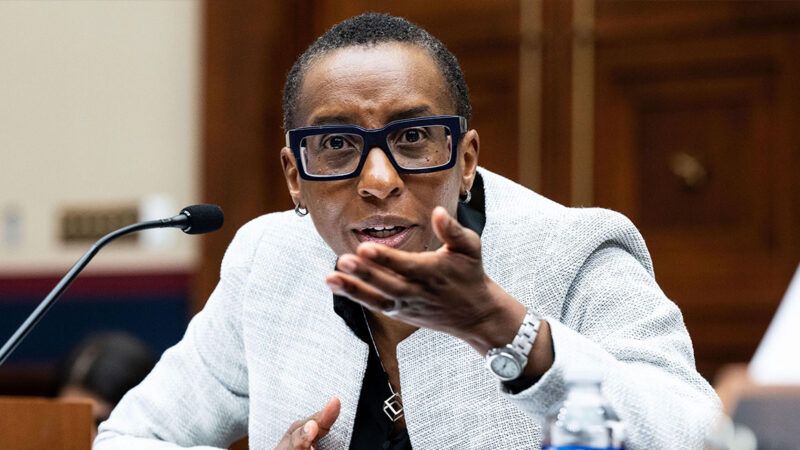Claudine Gay's Defenders Shot the Messenger
Harvard should pick someone with academic integrity as its next president.

Claudine Gay resigned as president of Harvard University in January, following numerous allegations that she plagiarized passages in her published works. But in some corners of the media, the fact that she committed plagiarism mattered much less than the fact that it was conservative writers who caught her.
Aaron Sibarium, a reporter at the right-leaning news website The Washington Free Beacon, performed the lion's share of the digging. Christopher Brunet, a conservative writer; Christopher Rufo, a conservative writer and activist; and Phillip Magness, a libertarian economic historian, also made important contributions. Their allegations were very serious, and what they found led many commentators—including Harvard students—to conclude that she should be held accountable. Even The Harvard Crimson's editorial board, writing in support of Gay, nevertheless acknowledged that she had committed plagiarism and that the university's investigation had been inadequate.
Gay's defenders said the charges against her lacked importance and that she was guilty of mere sloppiness—failing to sufficiently paraphrase the passages she had copied. This position became less tenable after subsequent reporting from Sibarium revealed that she had in fact committed traditional plagiarism as well: copying passages from other scholars without citing them.
The next course of action was to shoot the messengers. Since many of the people accusing Gay of committing plagiarism were conservative, their motivations were deemed political and thus dismissible. New York Times columnist Charles Blow described the campaign against Gay as "a project of displacement and defilement meant to reverse progress and shame the proponents of that progress."
Gay's defenders had a point, at least, in noting that conservatives had first set their sights on the president of Harvard after her disastrous testimony before the House of Representatives concerning antisemitism on campus. When Gay ultimately stepped aside, her resignation letter leaned into this explanation while merely nodding at the plagiarism accusations.
"It has been distressing to have doubt cast on my commitments to confronting hate and to upholding scholarly rigor—two bedrock values that are fundamental to who I am—and frightening to be subjected to personal attacks and threats fueled by racial animus," she wrote.
Gay is a more sympathetic figure when the hearing is considered in isolation. While her explanations of Harvard's speech policies in the face of relentless grilling by Republican political figures seemed tin-eared, it is in fact true that such policies are context-dependent; calls for political violence are not necessarily violations of Harvard's policies unless they are directed at specific individuals. She should not have lost her job for articulating that.
Yet Gay is no free speech hero. She may have defended provocative political speech at the House hearing, but her brief tenure at Harvard has not been marked by a dramatic return to free speech principles. In 2023, the Foundation for Individual Rights and Expression ranked Harvard dead last on its college free speech list. Indeed, one might conclude that in order to restore free speech at Harvard, different leadership is sorely needed.
In any case, the plagiarism allegations had teeth. Reporters discovered numerous instances of Gay lazily copying other scholars' exact passages without naming them. The political ideology of some of her accusers should make no difference; Gay must be held to the same standards as other professors and students. As one member of Harvard College's Honor Council wrote in an editorial for The Harvard Crimson days before her resignation, "There is one standard for me and my peers and another, much lower standard for our University's president."
When Harvard's governing board picks the next president, it should look for someone who both abides by principles of academic integrity and vows to improve the college's free speech standing.


Show Comments (57)